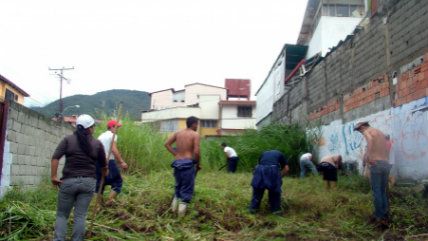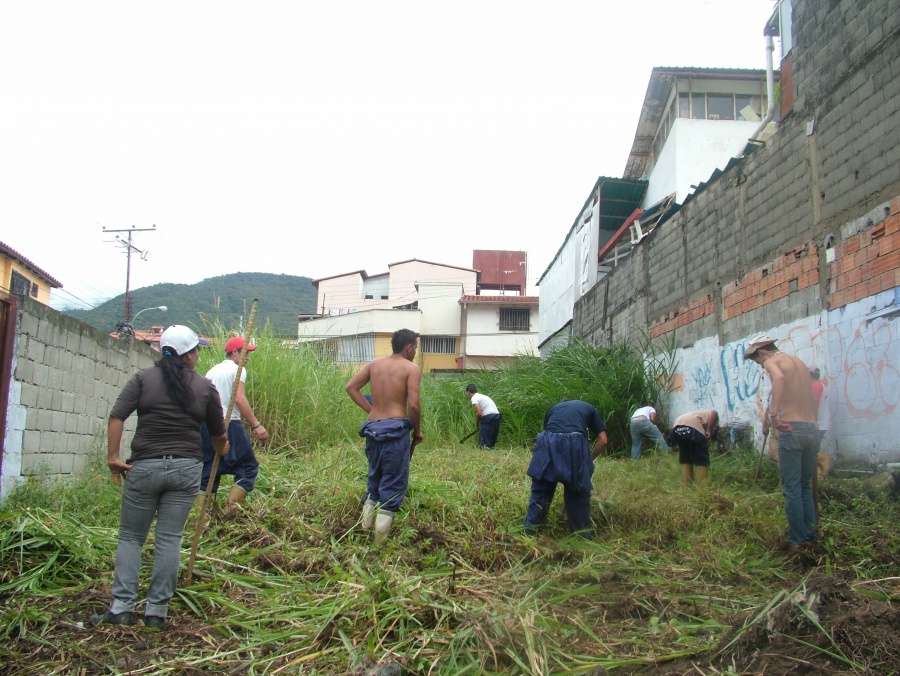Starved by Socialist Policies, Venezuelans Urged to Take Up Urban Farming
The Ministry of Urban Agriculture promotes home and community gardening in hunger-wrecked Venezuelan cities.


In once-industrial American areas like Brooklyn and Detroit, the abundance of abandoned warehouse rooftops and eager, earnest hipsters has led to an array of urban-farming experiments over the past decade. But while some such projects are designed to feed poor residents, city agriculture in the U.S. is still mainly a boutique affair. In hunger-wracked Venezuela, however, the government hopes to rely on urban farms to make up 20 percent of the socialist nation's food supply by 2019.
In February, the country launched a Ministry of Urban Farming, tasked with encouraging more home and community gardening and chicken-keeping. Its head, Lorena Freitez, said the push will help bring "food sovereignty" to Venezuelan cities, where both local food production and food imports are down and social unrest is increasing.
"Now, amid the narrow roads and crumbling shacks of one of South America's largest slums, a careful look yields something unexpected: a carefully tended tomato plant and a bush of basil leaves," the Associated Press reports. "Francisco Salazar, head of a community council that works in Caracas slums, says he and his neighbors are growing beets, black beans, lettuce and dozens of other vegetables in a large community garden."
Caracas residents haul dirt from nearby mountains to balcony, rooftops, and front-yard garden plots.
Call it locavorism or call it self-sufficiency, but community-based agriculture can't be anything but a win for impoverished communities. In America, many places are still grappling with zoning laws and building codes that prevent such projects from launching. Of course, with Venezuela, any growth in such activities is tempered by the fact that it's government polices putting people in poverty and creating food shortages in the first place.
Stephen Devereux, a development economist from the University of Sussex, told ResearchGate that "what is happening [in Venezuela] is strikingly similar to what happened to countries like North Korea, which had a severe famine in the 90s, because the government intervened too much in the economy. "There is a serious food crisis in Venezuela, because the government interfered in agricultural production and trade, and they are rationing electricity and water." The electricity rationing, which begun in April, was ended on July 4.
Hungry mobs have taken to attacking and looting supermarkets and food-delivery trucks. Meanwhile, peaceful protests and looters alike are met with repression by the country's National Guard. "What has been a slow-motion crisis in Venezuela seems to be careening into a new, more dangerous phase.," The Washington Post warns.
Over the first five months of this year, Venezuelans have violently looted businesses — or tried to do so — at least 254 times, according to the Venezuelan Observatory of Social Conflict. The number of protests over food has risen each month this year, to 172 in May. Several people have died and hundreds more have been arrested in incidents of unrest across the country.
Home and community gardens can't hurt, but as community-leader Salazar told AP, they're but a "Band-Aid" on a much bigger wound. Besides producing an insufficient quantity of food, it's hard to imagine urban-home gardens and community farm cooperatives avoiding the problems that plague Venezuelan grocery stores: the presence of desperate, hungry people and corrupt and meddling state officials.
As socialist policies put poor Venezuelans in more misery and food distributors in danger, capitalism and technology are helping keep Venezuela's middle- and upper-classes stocked with food. Residents told the Post they had been shopping on Amazon for staples such as powdered milk, sugar, and bread, items that were then shipped from Miami. Among those waiting in government food lines, meanwhile, a more localized form of entrepreneurship has emerged, with vendors selling black-market cigarettes and lemonade from old shopping carts.
Editor's Note: As of February 29, 2024, commenting privileges on reason.com posts are limited to Reason Plus subscribers. Past commenters are grandfathered in for a temporary period. Subscribe here to preserve your ability to comment. Your Reason Plus subscription also gives you an ad-free version of reason.com, along with full access to the digital edition and archives of Reason magazine. We request that comments be civil and on-topic. We do not moderate or assume any responsibility for comments, which are owned by the readers who post them. Comments do not represent the views of reason.com or Reason Foundation. We reserve the right to delete any comment and ban commenters for any reason at any time. Comments may only be edited within 5 minutes of posting. Report abuses.
Please to post comments


Venezuelans Urged to Take Up Urban Farming
You know who else urged citizens to take up farming?
Pol Pot?
+1 killing fields
Chairman Mao during the Cultural Revolution?
The Whole Earth Catalog?
*golf clap*
But can I buy a deed to a square mile plot of land in Venezuela for a dollar yet?
In February, the country launched a Ministry of Urban Farming, tasked with encouraging more home and community gardening and chicken-keeping
Now all that's left to do is to drive the urban dwellers from their high rise apartments, into the country side to continue the revolution. Too bad no one has ever tried this before. Maduro is a true revolutionary.
Soon, they will mint a "ministry for making it all better", which will decree a steak for every plate in the country. Surely then no-one will starve.
So different from how we do things here.
We've already reached 3rd world level corruption. We might as well go all the way now.
Just give me the list prices. How much to bribe the cop to go away, how much to give to the DMV clerk to just stamp the paper and get on with it, how much to keep the teachers quiet for the next three months. Streamlining standard operating procedures is not too much to ask.
It would be much better if our corruption was at the bottom instead of the top.
It is, but I can only afford to bribe petty government officials. I've seen the rum you drink, you maybe could afford the bribes to run one of the state-permitted factories. In a world where Jobs and Cheney can buy a peasant's body parts, the sky's the limit!
Tits. The answer is always tits.
"...they had been shopping on Amazon for staples such as powdered milk, sugar, and bread, items that were then shipped from Miami."
I am certain that those shipments arrived at their intended destinations unmolested.
So they are becoming serfs. I wonder if there is some sort of road they went down to get to this point?
But its okay, cause at least they are a democracy.
NEVER FORGET
The old socialism road to serfdom. This is the part where you run out of other people's money. Well, you don't run out, you just no longer have enough to share with the peasants.
Don't forget the best part of being a serf. That's the time when the soldiers (or gang members) come and take all the food you've spent the last 6 weeks growing.
It was the road of low oil prices. This is known.
The most efficient and effective form of governance is when people, singular or communal, directly apply their individual strengths to optimal existence in whatever non-violent form while relinquishing oppressive control over peers.
...BOTH modern capitalism and socialism fail after the while.
It's hard.
Call them "Socialist Gardens". I mean people should grow the food they eat and not from some evil korporatiun right?
Killing fields
"In hunger-wracked Venezuela, however, the government hopes to rely on urban farms to make up 20 percent of the socialist nation's food supply by 1919."
Fighting hunger with a time machine?!
It's so crazy, it might just work!
with a negative value for time in the equation the math all checks out, no more starving, now shut your mouth and get back to digging.
Maybe it's not 1919 A.D., it could be 1919, A.C. (After Chavez).
So Brooklyn hipsters are well prepared for the future their preferred government would create? Huh.
This could actually work if the urban farmers were allowed to sell their fare at a profit, but we know the Venezuelan gov't would frown on such activity.
Because there's no way your little plot is going to be raided by your starving neighbors.
Maduro will start seizing produce to feed the army before that happens.
I'm sure back yard blast-furnaces can't be far behind.
Sounds like Maduro has a plan; I'll bet it's for five years, too and intends a great leap forward.
BTW, the FBI says the hag skates.
I'm sure the rooftops are built well enough to handle the extra weight. And nobody will go around ripping off the plants just as they are maturing.
And the dogs (assuming any are left) won't pee on 'em, either. I think.
This reminds me of when Chairman Mao ordered tiny rural collectives to start producing steel.
News headline I would love to see: "Sean Penn shot in the face by Venezuelan ex-patriate"
"Sean Penn Ships Food to Starving Venezuelans" also pretty damned unlikely.
Venezuelan gov't: We're out of things to steal. Please make more!
It will work if they gather up the socialists and start harvesting strange fruit